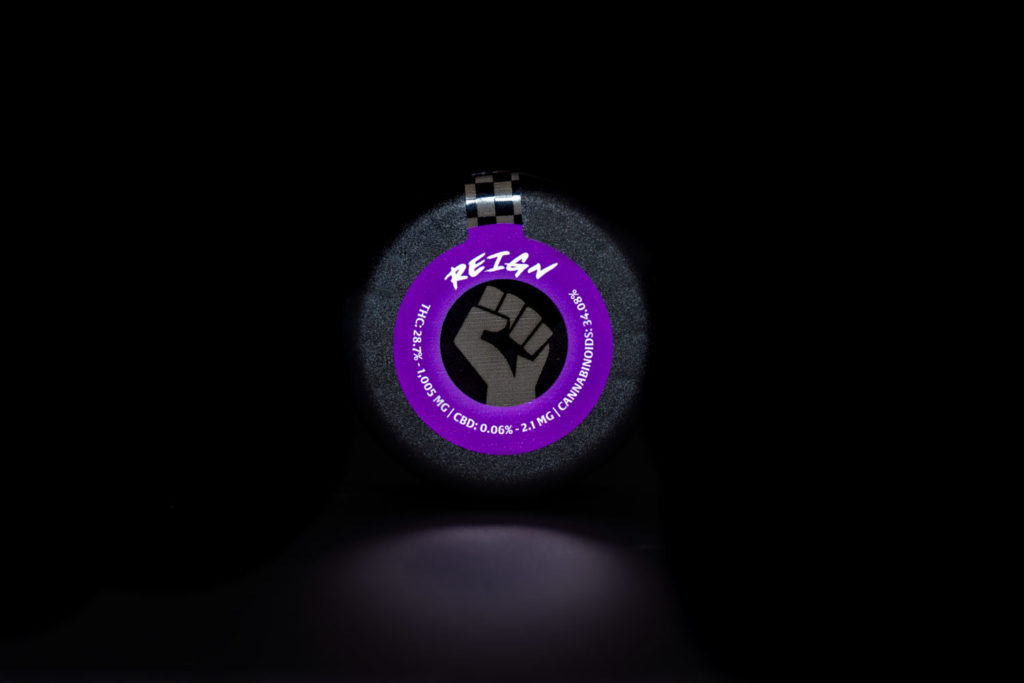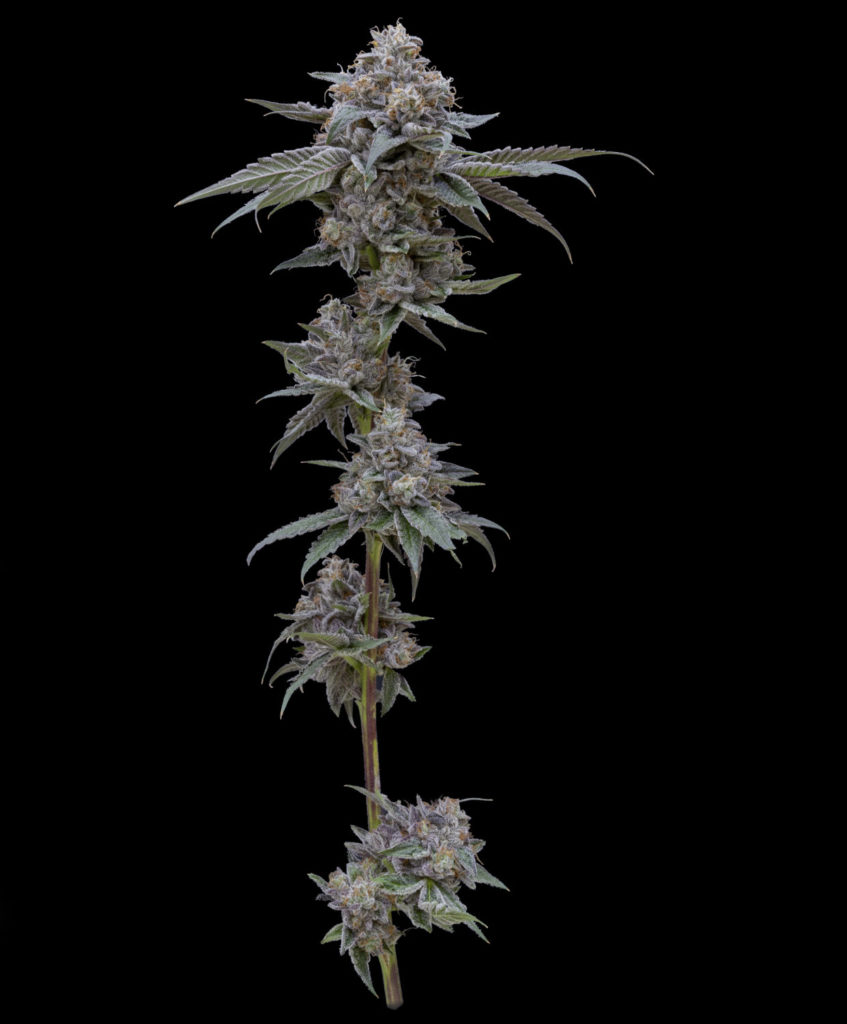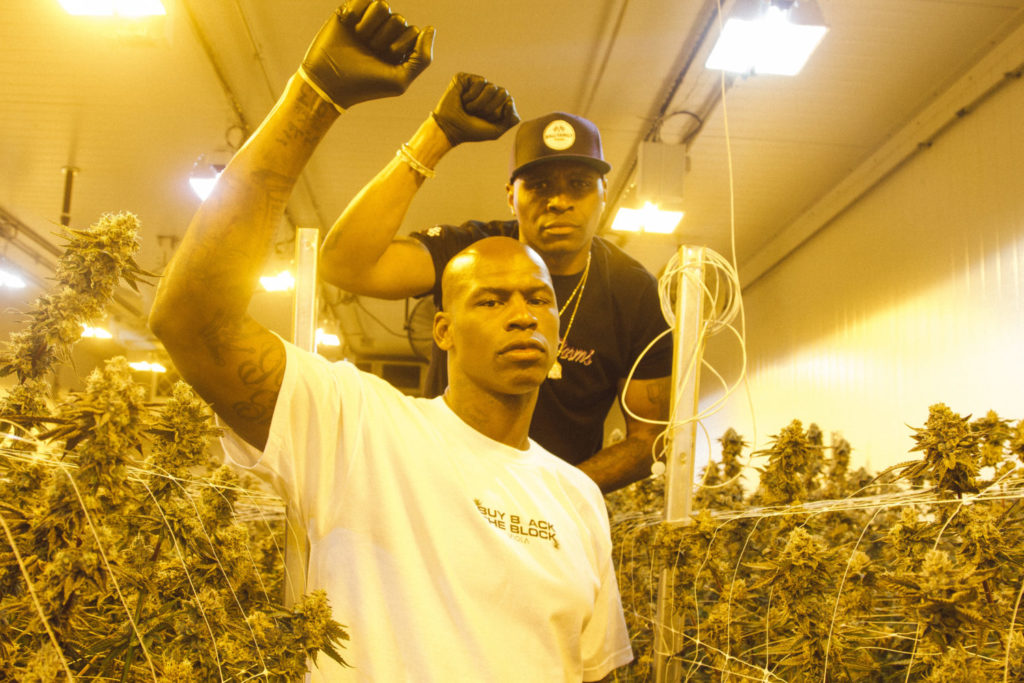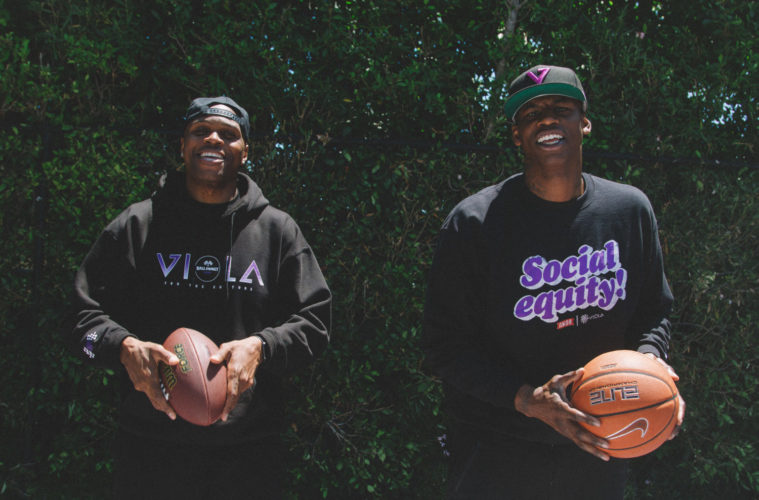Two big names in black cannabis are collaborating with the community in mind.
But before Ball Family Farms CEO Chris Ball could link up with longtime NBA veteran Al Harrington for their Reign collaboration, he had a lot on his plate:
His own career as a pro athlete in Canada. Using it as cover to bring weed back on the side to his beloved Los Angeles where he undercut the price point of locally grown cannabis. Getting caught by the feds. Learning to grow fire. Ball has packed it in.
When Ball returned from Canada he hadn’t just gained a new love of cultivation, he brought home some of the results regularly. While some might think the idea of smuggling weed into Los Angeles from abroad is a bit outlandish, for five years Ball found it to be a fantastic idea. Until it wasn’t.
The RICO Act got involved when one of Ball’s newer associates under federal surveillance got him caught up in the mix in 2010. Originally looking at a decade in prison, he ended up taking a plea bargain for a 30-month bid. As the rest of the cases attached to his played out, he lived a normal life for years on bail knowing he had the time looming. Eventually, his legal team was able to get him time served.
A few weeks later he kicked on the power in a 14-light grow.
“The first cuts I got my hands on were some SFV OGs out of the valley,” Ball told L.A. Weekly. “But you didn’t want to smoke mine. I was growing Poo Poo OG for the first year.”
While the early efforts were a little rough, at least he was able to keep the lights on. We asked Ball what the personal journey has been like from that first nine weeks to today where his cannabis is found on competitive shelf spaces across Southern California. Specifically, we asked about taking that pedigree and mindset required to be a pro athlete and using it for years to continually develop his cultivation skills.
At the very least he found the joy comparable, noting, “For me to get where I am from those first runs, to get to where I am today, felt the same way it felt for me when I first started playing football at eight-years-old and then was able to touch the NFL and fulfill my dream, you know? But again, starting from the time you’re eight to the time you’re 22 before you get to the league. How many years is that?”

Ball explained over all those years in football he put his 10,000 hours into refining the craft. He was rewarded with the results and opportunities the game gave him. He believes the same process has now occurred with cannabis since his first grow in 2014.
“I did everything. I made every mistake you could make in the book, you know? And from 2014 to 2018, I put in another 10,000 hours from a patient standpoint,” he said. “When I got my social equity license in 2018, once I figured it out the brand had already kind of revealed itself in the market.”
Ball said that all felt great as his weed made it to Prop D compliant shelves, but more importantly, he felt like he belonged there. He believes the attention and the acknowledgment that Ball Family Farms gets is deserved, “because I stayed there and I put in those 10,000 hours to really get good at this.”
Over the hours he hunted down the six phenotypes he has in full production right now, with another 40 strains he is keeping in the archive. The current staples include the Daniel LaRusso, Miyagi-Do, and the Bonsai, “which is also called the Sweep The Leg Drop.”
The genetics all came from Ball’s partner, Ashton Howarth. Howarth had been collecting for years. They hunted their winners from seed inhouse. Ball Family Farms is yet to take on any genetics from outside Howarth’s collection, but they came close with Runtz.

“And now we’re crossing shit right? We’ve done a full cross of our Daniel LaRusso with two of our other strains. We’re doing a cross with our Bruce Lee Roy and Bonsai to create some other things,” Ball said. “We haven’t taken cuts from anybody.”
Ball maintains his days in the traditional marker taught him whoever had the best pack was going to win. But he got tired of running into the same type of problems. He went back to that first cut as an example. “Oh I have an SFV and you have an SFV, but his is stronger than yours or his is greener than yours, or why is yours orange?”
Ball started to wrap his head around the concept of phenotypes and their varying quality. Essentially, if you pop a pack of seeds, each seed is a different phenotype of varying quality but they’re all the same strain. Ball knew he had to find his winners.
“And now, with all the different genetics and shit that’s going around, there are plant diseases going around the industry, you know?” Ball said referring to Hop Latent Viroid. The plant disease can spread through the roots in your facility. Once a plant catches HpLVd you have to create a cutting in a lab from the freshest piece of meristem that hasn’t been infected yet. It’s expensive and the only way to save the pheno. HpLVd essentially turns everything into mids. “That’s why a lot of these guys are coming up, they pull out their packs of Ice Cream Cake and it looks like dogshit or it doesn’t look how this one looks. I don’t want to bring any of that sickness into my facility.”
We asked Ball if he could imagine going back in time and telling himself when he caught the case that it would end up helping him get an express lane ticket via a social equity license?
“Hell no. I wake up every day and I still pinch myself,” Ball replied. “I can’t believe what happened. When I was sitting in that jail cell I thought my life was over. When I came out of federal prison, and I had nothing. I thought my life was over and I couldn’t believe it. I said, how did I go from a Berkeley graduate to pro football to federal prison to now not having $1 to my name? And for this thing to materialize and for Los Angeles to adopt the social equity program, and for that felony to throw me right to the top of the list and make me a tier-one social equity applicant and then being able to actually acquire the license, and then actually being able find people who are willing to help me navigate through the difficult and rigorous licensing process, and then find my partner that was a master of genetics to bring the right genetics to the table and teach me about genetics and pheno hunting and tissue culture, new shit. I can’t believe it. I can’t believe that I’m actually sitting here on the phone with you doing an interview for L.A. Weekly talking about how I’m this social equity lead cannabis grower and brand in the space. It’s just … it’s a dream come true.”
Since Ball is one of the more successful equity tales so far, we wanted to get his take on the haters. Sometimes people use the shortcomings of the implementation of equity programs as something to hold against the intention of the plans.
“I mean, for those types of people, those are obviously people who haven’t been disenfranchised by the war on drugs. They’re people who obviously haven’t grown up in a ZIP code where you’re watching drug deals happen on your street or you watch your best friend get shot in the stomach over an ounce of weed. These are experiences that I have in my mental Rolodex,” Ball said. For those people, “I don’t really have shit to say to them to be honest, because you can’t. Ignorance is bliss, right? So what can I say to that person? You haven’t gone through what I’ve gone through. You haven’t sat in the jail cell like I’ve sat in a jail cell.”
Ball feels the naysayers have never lived in fear that they might spend 10 years sitting in federal prison and not seeing friends and loved ones.
“For those people that try to bash the program or say that the program shouldn’t be around or use it as an excuse. I mean, I really don’t have anything to say to those people because there’s nothing I can really tell them because they haven’t gone through it. So I can’t even expect them to understand,” Ball said.
Ball obviously Reigns supreme as CEO at Ball Family Farms, but one issue around equity programs has been people putting someone in similar legal circumstances to Ball in a figurehead position. They may get $40,000 a year for doing nothing, but in reality, the bulk the profits generated in their name don’t return to the communities they came from, and the programs are thought to empower.
“God it’s crazy right? The predatory practices that are happening in this space right now are unbelievable,” Ball said. “And you know, it sucks man because these license holders that they’re using, they have no idea how much money they could be making but it’s because they don’t have the education.”
Ball, like most with a clue, doesn’t believe the puppeteers want people to realize how much money they’re missing out on. “It sucks and I can’t really be mad at the social equity applicant because they’re getting offered 40 grand or 50 grand or $5,000 a month or $10,000 a month to them. That’s more money than they probably seen in their entire life.”
We asked if, in the end, this could turn into generational wealth for some of the people that used others to get their foot in the door?
“One hundred percent. I mean it’s gonna. I mean let’s be real, right? In two years the federal ban will be lifted off this thing and you’ll be able to cross state lines. People will be able to move medicine across state lines,” Ball replied. He thinks it will go medical first, “but once it goes there we are talking about generational wealth in a major fucking way.”
These days, Ball is a year into a collaboration with retired NBA veteran Al Harrington’s Viola cannabis brand. Both men are excited about being able to support a fellow black entrepreneur with the project.
But then the world changed as they kept working toward the launch. A year ago, there was no COVID, and the debate currently kept front and center by Black Lives Matter activists was not at the forefront of American life like it is today. Ball emphasized the collab didn’t really have any social justice purpose behind it and he didn’t want the narrative to suggest it, but the times are a lot different.
Ball explained what happened: “So while all this stuff happened, the stars and the moon felt like they kind of just aligned. It was the perfect timing. The strain was ready, we had a drop date and all this social shit had happened so we said, you know what man, this will be the perfect time to use our platform to kind of get some money back, and to show that two African Americans can come together and push each other’s companies forward and get some money back toward a social justice charity group.”
Part of the proceeds will go to Roots & Rebound. The organization works to empower families and communities hit hardest by mass incarceration. Its work includes legal advocacy, education, policy reform and litigation. The model is based on direct impact.
“Chris came to the office, and we hit it off immediately,” Harrington told L.A. Weekly. “We had a lot of the same vision in regards to how we want to see the industry go. How we felt the way that people of color can get their just do and start dominating the industry.”

Reign, the results of their collaboration, is now available in over 50 stores throughout California.
We asked Harrington how cool it was for him, as a black entrepreneur, to be able to align his brand with a first wave guy who’s a part of what restorative justice looks like at the economic level.
“It’s amazing when you think about the story. We’re gonna give a lot of people hope,” Harrington said. “You know I’m saying, like even though it’s not perfect, the system isn’t perfect, you can still find a way to make it happen. You just got to keep believing in yourself and you’ve got to continue to put one foot in front of the other and make it happen sometimes. Sometimes you gotta will things.”
Past all the cool sidenotes, Harrington emphasized the quality of the product was what made the deal happen. Ball doesn’t actually smoke pot. Family and friends help with quality control. This left Harrington to decide what the two would be putting their name on.
“We did our taste test on different strains. It was really tough for me to decide which one. That was the toughest part of the process for me, trying to figure it out,” said Harrington.
Advertising disclosure: We may receive compensation for some of the links in our stories. Thank you for supporting LA Weekly and our advertisers.

